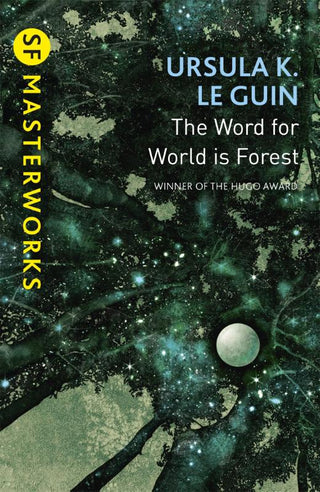In The Word for World Is Forest, Ursula K. Le Guin explores themes of colonization, environmentalism, and the clash of cultures. The story is set on the planet Athshe, where humans from Earth (referred to as "Terrans") have colonized the world to harvest its rich forests. The native inhabitants, the Athsheans, are small, peaceful beings who live in harmony with their natural surroundings and value dreams as a central part of their culture.
However, the arrival of the Terrans disrupts the Athshean way of life. The colonizers exploit both the land and the natives, forcing the Athsheans into labor and destroying their forests. The protagonist, Selver, an Athshean who suffers personal loss due to the colonizers, emerges as a leader who organizes a rebellion. In response to the Terrans’ violence, the Athsheans are forced to take up arms, which ultimately transforms their peaceful society.
The novel explores the moral complexities of resistance and violence, as well as the environmental consequences of unchecked human expansion. Le Guin's work reflects on the destruction of indigenous cultures and the long-term effects of colonialism on both the colonizers and the colonized. Through this sci-fi lens, the book raises questions about humanity's relationship with nature and the ethical boundaries of survival.
In The Word for World Is Forest, Ursula K. Le Guin explores themes of colonization, environmentalism, and the clash of cultures. The story is set on the planet Athshe, where humans from Earth (referred to as "Terrans") have colonized the world to harvest its rich forests. The native inhabitants, the Athsheans, are small, peaceful beings who live in harmony with their natural surroundings and value dreams as a central part of their culture.
However, the arrival of the Terrans disrupts the Athshean way of life. The colonizers exploit both the land and the natives, forcing the Athsheans into labor and destroying their forests. The protagonist, Selver, an Athshean who suffers personal loss due to the colonizers, emerges as a leader who organizes a rebellion. In response to the Terrans’ violence, the Athsheans are forced to take up arms, which ultimately transforms their peaceful society.
The novel explores the moral complexities of resistance and violence, as well as the environmental consequences of unchecked human expansion. Le Guin's work reflects on the destruction of indigenous cultures and the long-term effects of colonialism on both the colonizers and the colonized. Through this sci-fi lens, the book raises questions about humanity's relationship with nature and the ethical boundaries of survival.

